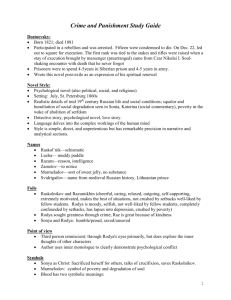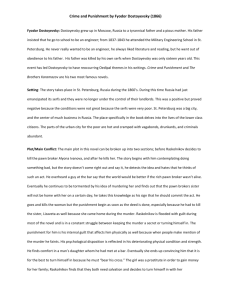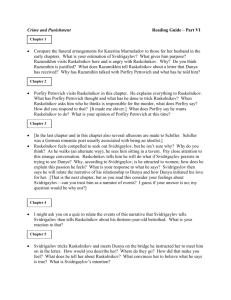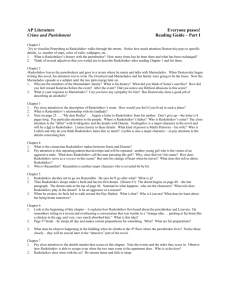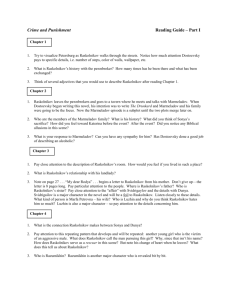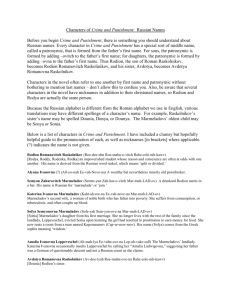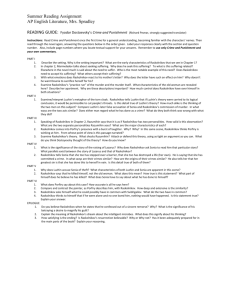Raskolnikov`s Dream in Crime and Punishment
advertisement
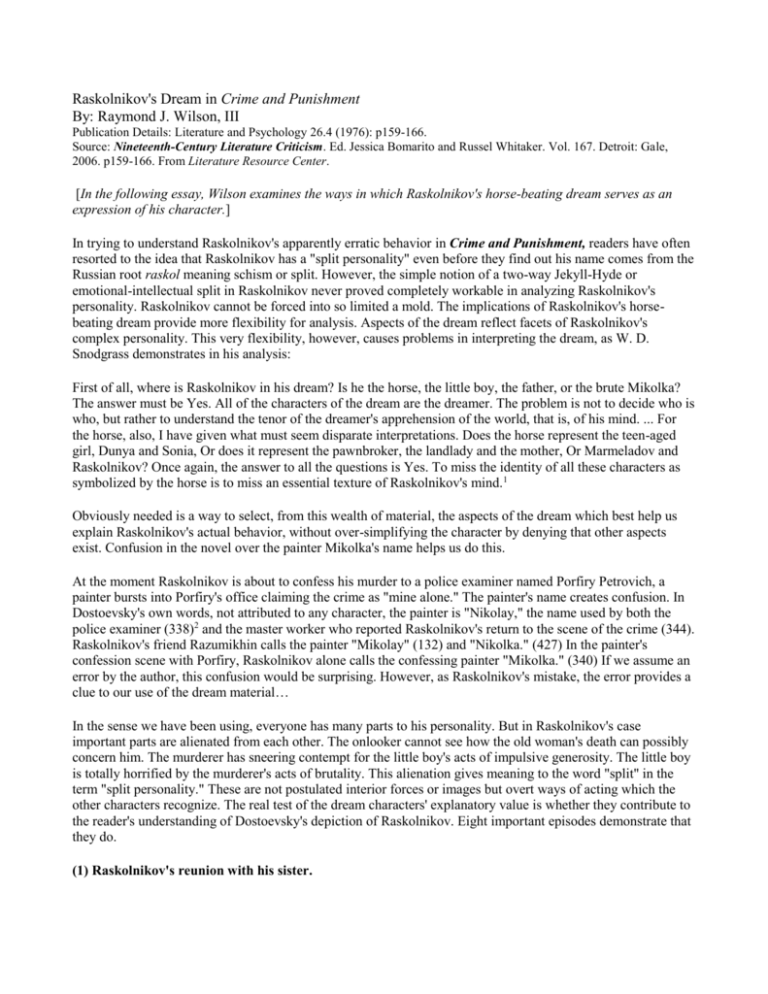
Raskolnikov's Dream in Crime and Punishment By: Raymond J. Wilson, III Publication Details: Literature and Psychology 26.4 (1976): p159-166. Source: Nineteenth-Century Literature Criticism. Ed. Jessica Bomarito and Russel Whitaker. Vol. 167. Detroit: Gale, 2006. p159-166. From Literature Resource Center. [In the following essay, Wilson examines the ways in which Raskolnikov's horse-beating dream serves as an expression of his character.] In trying to understand Raskolnikov's apparently erratic behavior in Crime and Punishment, readers have often resorted to the idea that Raskolnikov has a "split personality" even before they find out his name comes from the Russian root raskol meaning schism or split. However, the simple notion of a two-way Jekyll-Hyde or emotional-intellectual split in Raskolnikov never proved completely workable in analyzing Raskolnikov's personality. Raskolnikov cannot be forced into so limited a mold. The implications of Raskolnikov's horsebeating dream provide more flexibility for analysis. Aspects of the dream reflect facets of Raskolnikov's complex personality. This very flexibility, however, causes problems in interpreting the dream, as W. D. Snodgrass demonstrates in his analysis: First of all, where is Raskolnikov in his dream? Is he the horse, the little boy, the father, or the brute Mikolka? The answer must be Yes. All of the characters of the dream are the dreamer. The problem is not to decide who is who, but rather to understand the tenor of the dreamer's apprehension of the world, that is, of his mind. ... For the horse, also, I have given what must seem disparate interpretations. Does the horse represent the teen-aged girl, Dunya and Sonia, Or does it represent the pawnbroker, the landlady and the mother, Or Marmeladov and Raskolnikov? Once again, the answer to all the questions is Yes. To miss the identity of all these characters as symbolized by the horse is to miss an essential texture of Raskolnikov's mind.1 Obviously needed is a way to select, from this wealth of material, the aspects of the dream which best help us explain Raskolnikov's actual behavior, without over-simplifying the character by denying that other aspects exist. Confusion in the novel over the painter Mikolka's name helps us do this. At the moment Raskolnikov is about to confess his murder to a police examiner named Porfiry Petrovich, a painter bursts into Porfiry's office claiming the crime as "mine alone." The painter's name creates confusion. In Dostoevsky's own words, not attributed to any character, the painter is "Nikolay," the name used by both the police examiner (338)2 and the master worker who reported Raskolnikov's return to the scene of the crime (344). Raskolnikov's friend Razumikhin calls the painter "Mikolay" (132) and "Nikolka." (427) In the painter's confession scene with Porfiry, Raskolnikov alone calls the confessing painter "Mikolka." (340) If we assume an error by the author, this confusion would be surprising. However, as Raskolnikov's mistake, the error provides a clue to our use of the dream material… In the sense we have been using, everyone has many parts to his personality. But in Raskolnikov's case important parts are alienated from each other. The onlooker cannot see how the old woman's death can possibly concern him. The murderer has sneering contempt for the little boy's acts of impulsive generosity. The little boy is totally horrified by the murderer's acts of brutality. This alienation gives meaning to the word "split" in the term "split personality." These are not postulated interior forces or images but overt ways of acting which the other characters recognize. The real test of the dream characters' explanatory value is whether they contribute to the reader's understanding of Dostoevsky's depiction of Raskolnikov. Eight important episodes demonstrate that they do. (1) Raskolnikov's reunion with his sister. On seeing his sister for the first time in three years, Raskolnikov brusquely denounces her marriage plans. Those present make allowances for the insult because of his "condition," which we can see as the temporary dominance of the Mikolka personality. Dr. Zosimov later recalls this in terms that could apply to Mikolka: a "monomaniac, who had been goaded almost to raving madness by the smallest word ..." (213) But the next morning, Raskolnikov arises talking to himself the way the dream's onlooker talked of those who tortured the animal. In the dream the onlooker implies: What business is it of ours? He says, "They are drunk, they are playing the fool." (56) And awake, Raskolnikov thinks: His most horrifying recollection was of how 'ignobly and disgustingly' he had behaved, not only in being drunk, but in taking advantage of a young girl's situation to abuse her fiancé in front of her, out of stupid and hastily conceived jealousy, when he knew nothing either of their mutual relationship and obligations or, properly speaking, of the man himself. And what right had he to condemn him so hastily and rashly? Who had appointed him the judge?(201) The onlooker in the dream said: "It's none of our business. Let us go." Like him, Raskolnikov now says ... of course, I can't gloss over or efface all this nastiness, now or ever ... and so I must not even think of it, but appear before them in silence ... and not ask forgiveness, but say nothing ...(202) Yet, on seeing his mother and sister again, Raskolnikov makes all right again with the charm of a little boy-astounding the others present. Their mother's face "shone with pride and happiness" as she notes "how simply and delicately" Raskolnikov achieved the reconciliation. And his friend Razumikhin thinks: "Now that's what I absolutely love him for!" (215) (2) The murder itself. Before the crime, the onlooker in Raskolnikov's personality tells him that he cannot possibly be serious in his plans--but not from any sense of moral outrage; rather, being split from the murderer, the onlooker feels no identity with the Raskolnikov who can be brutal. However, when the time comes, Raskolnikov, like Mikolka, strikes Alyona repeatedly with the blunt side of the axe. Raskolnikov then reacts in horror at his own crime just as the little boy of the dream reacts to Mikolka's cruelty. Lizaveta's arrival turns little-boy horror into terror; and as Raskolnikov flings himself forward with the axe "her lips writhed pitifully, like those of a young child when it is just beginning to be frightened ..." (76) Lizaveta, like the old mare, responds minimally and ineffectively. And, as a voice in the dream had urged (55), Raskolnikov mercifully finishes her off with one blow from the sharp edge of the axe. Again Raskolnikov first reacts, like the little boy, with horror and repulsion for what he had done, rather than with "fear for himself." In the dream the onlooker treats the crime as trivial: "'Come away,' said his father, '... Come away; don't look!'" (54) And "It is none of our business. Let us go." (56) After the crime, Raskolnikov turns more and more to this attitude: But a growing distraction, that almost amounted to absentmindedness, had taken possession of him; at times he seemed to forget what he was doing, or rather to forget the important things and cling to trivialities.(77) Raskolnikov calmly washes his hands and cleans the axe, treating the bodies in the other room and the money in the bedroom as if they were none of his business. Near-discovery shakes him out of this mode. But as he escapes, we listen to an interior debate. One voice urges him to run, to hide in the doorway, to take a cab. The other, parallel to the dream's onlooker calms him and urges him to act as if nothing has happened. (3) Raskolnikov's meeting with Zametov. When he meets Zametov, the police clerk, at a bar called the "Crystal Palace," Raskolnikov tries to talk of the axe murder like an onlooker who can have only passing interest. But "in a flash he remembered, with an extraordinary intensity of feeling," the scene in the murder room. And he "was suddenly filled with a desire to shriek out, to exchange oaths with them, stick out his tongue at them, mock at them, and laugh, laugh, laugh." (155) Raskolnikov's Mikolka personality makes Zametov shiver and recoil suddenly from Raskolnikov. Dostoevsky describes the result of the struggle between the Mikolka personality and onlooker in Raskolnikov's appearance: The latter's eyes were glittering, he had grown shockingly pale, and his upper lip trembled and twitched. He leaned as near as possible to Zametov and began moving his lips, but no sound came from them; they remained like this for half a minute. He knew what he was doing, but he could not restrain himself.(159) Zametov's obvious recognition of the murderer brings Raskolnikov "to his senses." The onlooker emerges again, and Raskolnikov successfully acts as if the murder is none of his business. (4) Raskolnikov's return to the scene of the crime. When Raskolnikov leaves Zametov, the switches continue. Meeting Razumikhin at the door of the bar, Raskolnikov viciously insults him. Then he stands by, watching an attempted suicide as if it were none of his business, never even wondering if he should try to help. He goes to the murder scene where he must pretend that the crime is no business of his. Suddenly switching to the horrified little boy, he asks to be taken to the police. People hesitate and the commotion of Marmeladov's accident distracts him. He tries to help the man and impulsively gives all his money to the widow for the funeral. This little-boy generosity stirs Raskolnikov to great joy, but then his onlooker takes control and misinterprets, reinforcing the theme that Raskolnikov can go on living as if the crime were none of his business: "... it had come to him suddenly, as to a man clutching at a straw, that even for him it was 'possible to live, that life was still there, that his life had not died with that old woman.'" (182)…
